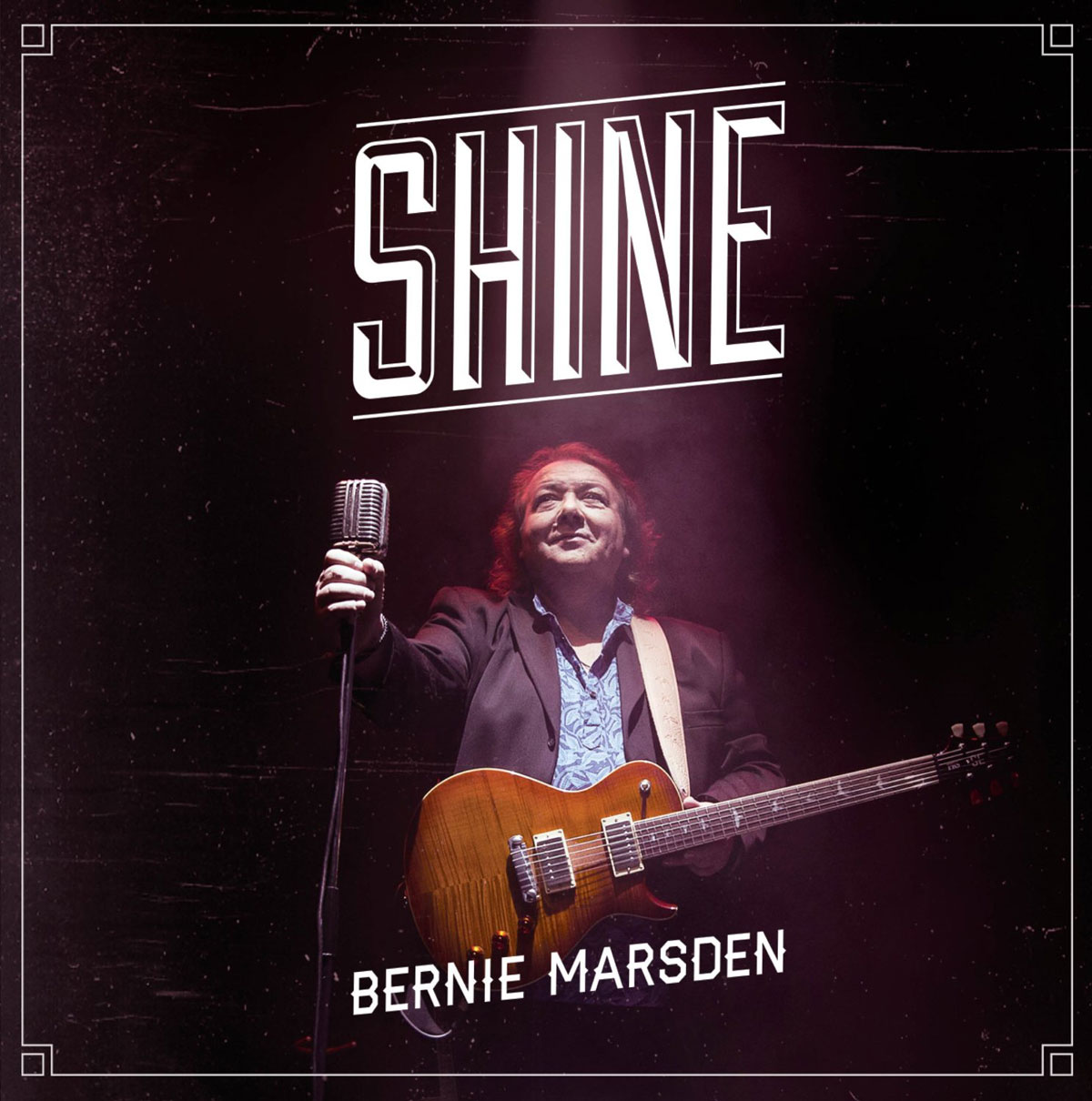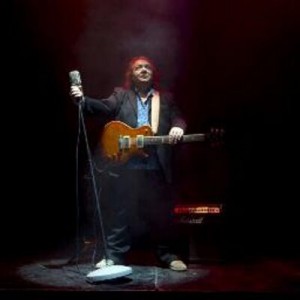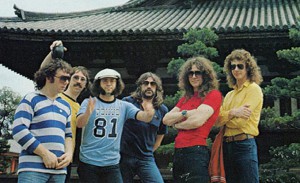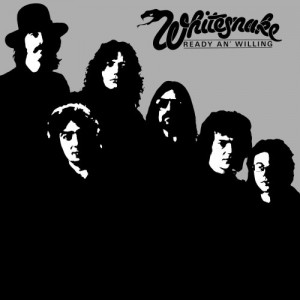Bernie Marsden släpper i dagarna sitt nya album “Shine” och det låter inte dumt alls. Ett härligt sväng som visar att gammal är äldst. Med på albumet finns bl a Joe Bonamassa och självaste David Coverdale. Den senare bidrar med sång på en ny version av Whitesnakeklassikern “Trouble”. Rocksverige ringde upp Bernie i London för att bl a snacka om “Shine”, Paul McCartney, skivaffären Mickes skivor och hur ett brutet ben troligtvis satte stopp för ett genombrott för Whitesnake i USA redan 1981.
We would´ve gone to America, but David broke his leg badly in an accident on stage. We were supposed to tour America with AC/DC after the European stuff, but that got cancelled because David couldn´t walk. We´ll never ever know now, but it´s possible we would´ve broke America before “1987”?
When did you start working on the album and how long did it take to put it all together?
Bernie: I spent about ten months making the record. We began in February last year, finished recording it in October and then we mixed it and the whole thing was finished by November. I wasn´t there every day. I´d work for two, three days and then I´d take ten days away and then work another couple of days, because nobody in the world has enough money to be in Abbey Road every day.
What´s it like recording there? Can you feel the music history in the walls?
Bernie: It´s fabulous and I think you can. I was in there quite a bit in the 70´s, when I was like a baby, and even then you were always aware, but no matter what with all the history, Abbey Road is a great recording studio. Probably one of the, if not the best recording studio still, in the world. When you add on the top of that, the whole history with Pink Floyd and The Beatles and all these other people, it becomes like a little magic place. It should be a museum, really. It´s a great place to record and about a year ago, last June into July, I was recording in Studio 3 and Paul McCartney was in Studio 2. It doesn´t get any better than that.
And there is a McCartney connection there, right?
Bernie: I didn´t play with him, but I was being considered to play with Wings, but while the waiting game was going, I got a call from David (Coverdale) and it was the same time that Whitesnake began in ´77. It´s a long story, but I never turned it down. He never offered me the job and I never turned it down. It was a possibility that we were gonna work together, but it never happened.
Do you know how he came to hear about you?
Bernie: Yes, that´s the easy story. I was working with Jon Lord and Ian Paice with “Paice Ashton Lord” and the guy who put together the horn section, was Howie Casey and he was the leader of Paul McCartney´s brass section. He´s the guy that plays on “Band on the run” and he recommended me to Paul when they needed a new guitar player, so that´s how it began.
You mentioned that Paul was in the other studio, so did you hook up and sit down for a chat?
Bernie: (laughs) No, we had already crossed those bridges ten years ago or maybe more? I went to a thing here in London with Zak Starkey, because I was working with him at the time and obviously Paul has known him since he was a baby. They saw each other and Paul said “Who is this?” and Zak said “Well, you know each other!” and I was like “No, no, no!”. Zak said “It´s Bernie Marsden!” and Paul answered “Oh, the man who turned me down!” (laughs) But he was great and said “You´ve done ok, haven´t you? You´ve been quite successful?” and I said “Thank you very much, and so have you!” (laughs) It was nice and it´s a nice thing to talk about.
Did you ever feel you missed out on something?
Bernie: No, I can honestly say that if I had joined Wings at the time, I don´t think you and I would be talking now. If you think about the guys who played with people like Paul in the last 30 years, it´s very difficult to find anyone who´s made a career off of it. It wasn´t a decision I thought about in a bad way at the time. Still, without The Beatles I wouldn´t play the guitar. It was very exciting, but from the next day when I said to David (Coverdale) “Let´s do it!”, I never looked over my shoulder one day.
A standout track on the album is ”Lady friend”, which I understand is about a former manager?
Bernie: It´s mainly about one person, but it´s kinda about women, really. But this particular one features quite a bit in it. When she hears it, she´ll go crazy and she´ll be calling me up and threathing to take me to the lawyers, but she´ll secretly like it very much because she has a song written about her. It was a little bit like a cry for help, that´s what it was, but it made a good idea for a song.
On an album like “Shine”, do the songs come easily when you sit down and work them out or is it a lot of work?
Bernie: I don´t find songwriting hard work. Making the decision how to make that song as good as you can, that can be hard work. I still write a lot. Some of these songs are new to you, but they´re not that new to me. I´ve kinda been writing stuff and doing pretty good demos, for me, thinking “One of these days, maybe this guy will sing on it or this person will sing this!” and it just happened that it´s me singing them all instead of somebody else. Two of the songs, I recorded for an album six or seven years ago and people said to me “You should think about some of the songs that you´ve already released, because not many people have heard them”, so that was a very good advice. In fact “Lady friend” was on an album called “Big boy blue”, but it was only available from my shows. If you find that one, you can hear the original, but it´s quite different. A friend of mine called me and said “You must record “Lady friend”, so at least one person is happy.
Joe Bonamassa is on the album. Is he one of the “new” guitar heroes?
Bernie: My good friend Joe! I think he´s the new guitar hero! He´s a great musician and a really nice guy. He came in to record with me on his day off. He was in the middle of a really busy tour over here in England. He had one day off and I asked him “Could you come to the studio and play with me?”, he just said “When?” Then when he came to the studio, his technician came with him and he said “You know this is his day off?” and I said “No, he never told me that.”, but that´s the kinda guy he is and he plays great.
A guy like him, does he do it in one take or does it take a long time?
Bernie: It was strange. When he was playing in the studio with me, it was like watching myself 20 years ago when I was doing lots of sessions. He was in there, besides that track and a couple of other things we did, maybe one hour? There´s gonne be a download with another version of that song, where he plays guitar all the way through as an instrumental.
And then Don Airey is on the album as well?
Bernie: Yeah, we go back a long time. He´s a good friend and I played on his latest album, so I called him up to return the favor. He just happens to be one of the greatest players in the world! He´s played with everybody.
Then of course you have mr David Coverdale on your new version of “Trouble”?
Bernie: Yeah, he´s a young singer! (laughs) It was great! We did Sweden Rock Festival together and that was the first time we worked together in a live situation with Whitesnake, in 30 years. Nobody knew and it was kind of a secret. Before that we were ok, but since then we´ve become very close again and I just called him up and said “Look, I´m making an album and I´d like you to sing!” and he said “Of course, what do you want me to do?”, so you can´t ask for more than that.
Was “Trouble” the obvious choice or were there other titles you were thinking of?
Bernie: What I did was that I sent him a couple of different ideas and then I said “But I´d really like you to sing Trouble, because I´ve recorded it a different way.” He said “Let me hear it!” and then he just went “That´s the one for me” and that was it. It´s great because it´s one of the first songs we wrote together. It was recorded very quick. We would write the songs on a Tuesday and record them on Wednesday and we always said that if we did “Trouble” again, we´d do it a little tougher and maybe a bit more powerful. He´s singing great and in the same key. I think on the radio in America, they´re gonna think it´s Whitesnake.
I interviewed David about a year ago and he was talking about reaching out to people he´d lostvtrack of and so on, since he was getting older. Was this a case of that?
Bernie: I don´t know, but maybe because of him and I getting together three years ago, maybe he thought there´s other people out there? That´s up to him and it´s his business. As far as I´m concerned, him and I, we´re like we were when we first got together, which is great. We´re just a little bit older. (laughs)
Who were your influences when you started out as a guitar player?
Bernie: My main influence was… when you´re my age, we all begin with The Beatles really and then you learn to play a little bit and along come these guys like Eric Clapton, Peter Green and Jimi Hendrix. I just thought that that´s what you need to do, so if you go back, most of the people from my generation are like that, really.
Are you gonna be touring with this album?
Bernie: Yeah, we´re gonna do some shows in September and October and hopefully I´ll be over in Sweden late into the winter? Not when it gets too much snowy, but a little bit. Maybe I can open up for somebody and we can play one of the bigger gigs.
When you look back on the days with Whitesnake, is there one particular album that stands out more than the others?
Bernie: No, not really. I have a great love for “Ready an´ willing”, but I think it´s because at that time the songwriting into something very powerful and with “Fool for your loving” we almost immediately knew it was special and Ian Paice came into the band. As a live unit, you just couldn´t wait to get on stage. Every night was just “Wow, I´m playing with Ian Paice and Jon Lord!” It was really good! Not to say anything bad about the previous guys, but Ian Paice is just the man and just incredible! As good as the band was and you had this wonderful singer who was fantastic with the crowd, you just knew you were in a great band. That´s how I remember it. We spent a lot of time at John Lennon´s house recording “Come an´ get it” at his private studio and that was special. There are lots of stories, but I forget most. (laughs)
Back then, was it the rock and roll lifestyle to the max?
Bernie: I´m a great believer in that people like to invent eras and I think that the great rock and roll lifestyle was kinda the 80´s. People like Mötley Crüe, but this to me was all about image and about how many TV´s you could throw out the window and then secondly “What shall we do on the record?” The Who already had thrown more TV´s out the window before these guys were born and made great records! We had a good time on the road and nobody was an angel. We did our share of the “rock thing”, but we were just people and that´s hopefully why I can still talk to people now. Treat people as you like to be treated. I can give many names of people who treated people badly and there´s nobody interviewing them now at the age of 60. It sounds a bit serious, but that´s the way I feel about it. The rock star thing, sure we had a good time, don´t misunderstand me, but everything was about the music.
We´re there a lot of people taking advantage of you when it came to record deals and so on?
Bernie: I could do a whole interview about that. We´re not alone and even though I or we never got the return that we should´ve got, I still got a return greater than most people can dream of. If you look back and say “This guy screwed me!” without looking forward and it´s gone, what can you do tomorrow? Once the water goes under the bridge, it´s gone and if you think about that water all the time, you´re never gonna find it. Sure, there were some bad deals, but you sign a contract and you don´t know. You sign it in June and you don´t ever, ever dream that in the next June you´re gonna be the biggest band in the country. You made a genuine mistake and some people made big, big advantages from you. But some of those guys are not around anymore, so what good did it do them?
Is the business side of it easier or harder today?
Bernie: I think it´s harder. I wouldn´t want to be beginning today. I don´t know? People say “You´re very clever and very talented and you still have a career 40 years after you became a professional.” And I say “Well, maybe I´m lucky?” and then they say “No, you´re very talented!” I´m sure there are young people who are very talented and who have a great difficulty making a deal. I think it was easier when I was 20 and it was easier to get a record deal. It might have been a bad record deal or a poor record deal, but it would be a record deal. Nowadays it´s very difficult to get a record deal, but I believe the main reason for that is because people can make an album in the bedroom. You have to find what you want to do yourself and if you make that path clear, then you know where you´re going. Wow, that sounds very serious. (laughs)
What would you say has been a high point of your career and what has been a low point?
Bernie: One of the high points of my career was touring with AC/DC. Whitesnake opened for them in 1980 and it was fantastic! They were such good guys and we had a great time. Before that, we had played to 1500 people in Germany and after that we played to 15.000. We played for an hour and the crowd would go crazy and the AC/DC guys said “Do another one! Do another two!” They were great and I remember saying to David “If we ever become as big as this, this is how we have to treat other people.” We would´ve gone to America, but David broke his leg badly in an accident on stage. We were supposed to tour America with AC/DC after the European stuff, but that got cancelled because David couldn´t walk. We´ll never ever know now, but it´s possible we would´ve broke America before “1987”? I guess another high point is when I got my first gold disc. It makes you feel good. It was for “Ready an´ willing”. I´d done a lot of stuff before that, but that was the first band thing. The low point? I don´t know. I guess about six months after the end of the first Whitesnake, that was probably my low point. I was feeling kinda sorry for myself and thinking “Maybe I´ll sell my guitar?”, because you´ve been in a big band and then you´re not in a big band and you think it´s never gonna happen again. But this person from “Lady friend” said “Are you crazy? You wrote the songs. Pull yourself together!”. She was great! It was a low point, but it wasn´t low for very long. “Stop feeling sorry for yourself and do something!”, so I did. It was good advice. By the way, when I´m in Stockholm I go to a record shop called Mickes. Do you know it?
Of course I do. He´s open 24/7.
Bernie: He´s like an old hippie. When I come to Stockholm, I always stay in the apartment above the shop. He´s a good guitarist and if you go there, say “Bernie says hello!”! (laughs)
Av: Niclas Müller-Hansen





